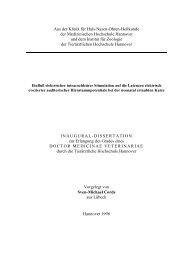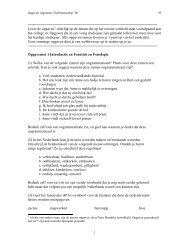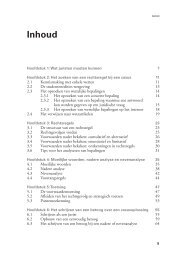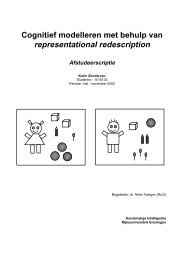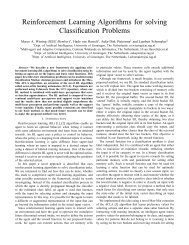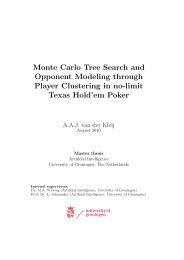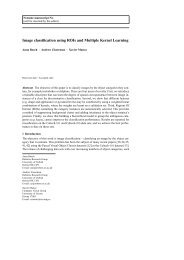Presuppositions in Spoken Discourse
Presuppositions in Spoken Discourse
Presuppositions in Spoken Discourse
You also want an ePaper? Increase the reach of your titles
YUMPU automatically turns print PDFs into web optimized ePapers that Google loves.
Accommodation and Presupposition<br />
Here, for all models (or worlds if you prefer) where it is true that there is a K<strong>in</strong>g of<br />
France, and if he is bald then he lives <strong>in</strong> exile, it is also true that if there is a K<strong>in</strong>g of<br />
France who is bald then this <strong>in</strong>dividual lives <strong>in</strong> exile. The hearer is believed to<br />
prefer the strongest read<strong>in</strong>g because he assumes that the speaker is follow<strong>in</strong>g the<br />
Gricean Maxim of Quantity and say<strong>in</strong>g as much as he knows. If the speaker had<br />
meant the weaker read<strong>in</strong>g, he would have chosen a different means of expression.<br />
There are two ma<strong>in</strong> problems with us<strong>in</strong>g the IP to account for the proposed<br />
preference for global accommodation. First, <strong>in</strong> some cases neither the local nor the<br />
global read<strong>in</strong>g is stronger than the other. Second, the read<strong>in</strong>g that results from<br />
global accommodation isn’t always the strongest read<strong>in</strong>g. Geurts (2001) and Beaver<br />
(to appear) have po<strong>in</strong>ted out that the IP will make different predictions depend<strong>in</strong>g<br />
on the type embedd<strong>in</strong>g. For example, Beaver (to appear, p. 36-37) writes “In the<br />
cases of accommodation triggered by a presupposition <strong>in</strong> the consequent of a<br />
conditional, or the scope argument of a universal quantification…” IP will<br />
“…result <strong>in</strong> the preferences Global > Local > Intermediate. Note that the exact<br />
preference result<strong>in</strong>g from a preference for logical strength will vary accord<strong>in</strong>g to<br />
the monotonicity properties of the embedd<strong>in</strong>g environment, so that, for <strong>in</strong>stance,<br />
the quantifier not every yields a preference Global > Intermediate > Local.” Thus, it<br />
is hard to use the IP as an explanation for a general preference for higher levels of<br />
accommodation.<br />
Geurts (2001) concludes that <strong>in</strong> study<strong>in</strong>g cases of presupposition projection<br />
under several different types of embedd<strong>in</strong>g, it is not possible to f<strong>in</strong>d support to<br />
differentiate between the BP or the IP. In many cases the IP will make the same<br />
predictions as the BP, or there will be no preference predicted. However, advocates<br />
of the IP have argued that it is a better explanation because it may be a more<br />
general constra<strong>in</strong>t on <strong>in</strong>terpretation that applies to other structures, not just to<br />
presuppositions. These other structures <strong>in</strong>clude reciprocals, discussed <strong>in</strong> Dalrymple<br />
et al. (1991) and plural predication (W<strong>in</strong>ter, 2001). If this could be shown, it would<br />
make a stronger case for the IP. However, Geurts shows that while the IP may be<br />
able to expla<strong>in</strong> some other non-presuppositional phenomena, it clearly makes<br />
wrong predictions when applied to other phenomena. In the end, we have no clear<br />
way to determ<strong>in</strong>e if someth<strong>in</strong>g like the IP or the BP is function<strong>in</strong>g and there seems<br />
to be no clear advantage to either proposal.<br />
Geurts (1999) gives two other potential explanations for the proposed<br />
preference for global accommodation. 19 The first suggestion is that speakers will<br />
prefer global accommodation because they will try to make the most relevant<br />
<strong>in</strong>terpretation they can and he gives the follow<strong>in</strong>g example (Geurts 1999, p. 58).<br />
(44) a. Fred didn’t br<strong>in</strong>g his wife.<br />
b. [ x, y : Fred x, y is x’s wife, ¬ [ : x brought y] ]<br />
19 He also presents the IP.<br />
139



